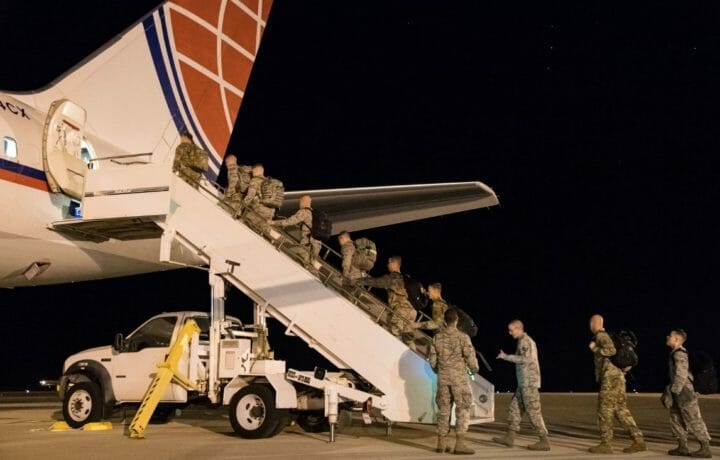The Secretary of Defense, Lloyd J. Austin III, on August 22, ordered the activation of the Civil Reserve Air Fleet (CRAF). The purpose is to provide the Department of Defense (DoD) access to commercial aircraft to augment their own air assets in the “evacuation of U.S. persons, Special Immigrant Visa applicants and other at-risk individuals from Afghanistan.”
The statement continues how these aircraft will be “used for onward movement of passengers from temporary safe havens and interim staging bases” and not fly into Kabul’s Hamid Karzai International Airport.
Secretary Austin’s directive called for 18 aircraft to be made available:
- United Airlines – four
- American Airlines – three
- Atlas Air – three
- Delta Airlines – three
- Omni Air – three
- Hawaiian Airlines – two
Civil Reserve Air Fleet
The purpose and background of the Civil Reserve Air Fleet (CRAF) is best explained by the Department of Transportation. The fleet is a cooperative and voluntary program which involves the DoD, DOT, and civil air carriers. The purpose is as noted above, to augment the DoD aircraft capabilities in time of crisis.
The CRAF was created following the Berlin airlift in 1951 and is administered by the U.S. Transportation Command (USTRANSCOM). Airlines volunteer their aircraft for activation and via a contractual agreement are given preference in carrying peacetime cargo and passengers for the DoD.
The U.S. Air Mobility Command explains how air carriers “must maintain a minimum commitment of 40% of its CRAF-capable fleet. Aircraft committed must be U.S.-registered and carriers must commit and maintain a 4:1 flight-deck crew ratio for each aircraft accepted in the fleet.”
The participation of 18 aircraft is but a small fraction of aircraft available to the CRAF, “as of August 2021, 24 carriers and 450 aircraft are enrolled in CRAF. This includes 413 aircraft in the international segment with 268 in the long-range international section and 145 in the short-range international section. There are 37 aircraft in the national segment.”
In the DoD’s statement, they noted they did not expect this request to have an impact on commercial air capability in the United States. This is the third activation of the CRAF – the first was August 1990 – May 1991 – Operation Desert Shield/Storm and the second was from February 2002 to June 2003 and Operation Iraqi Freedom.
Airline perspective
Atlas Air issued a statement noted how the airline was “proud to support U.S. relief efforts or Afghanistan,” flying evacuees safely to the U.S. and are prepared to add capability should it be necessary.
Delta advises that they had been given a heads up several days prior to the activation and were prepared to execute when the CRAF request was received. “For decades, Delta has actively played a role in supporting U.S. Military and our troops,” said John Laughter, Delta EVP and chief of operations. Delta added that it routinely carries U.S. troops between the U.S. and international locations via charters.
United noted via a Tweet how they will “operate flights to bring our troops, American civilians and Afghan citizens who have risked their lives to help keep them safe, to the U.S.”
American Airlines, in a statement, noted how they are “proud to fulfill its duty to help the U.S. military scale this humanitarian and diplomatic rescue mission.”
President Biden, in a press conference on August 22, noted that the military airlift has successfully evacuated over 28,000 individuals from Afghanistan since August 14.




